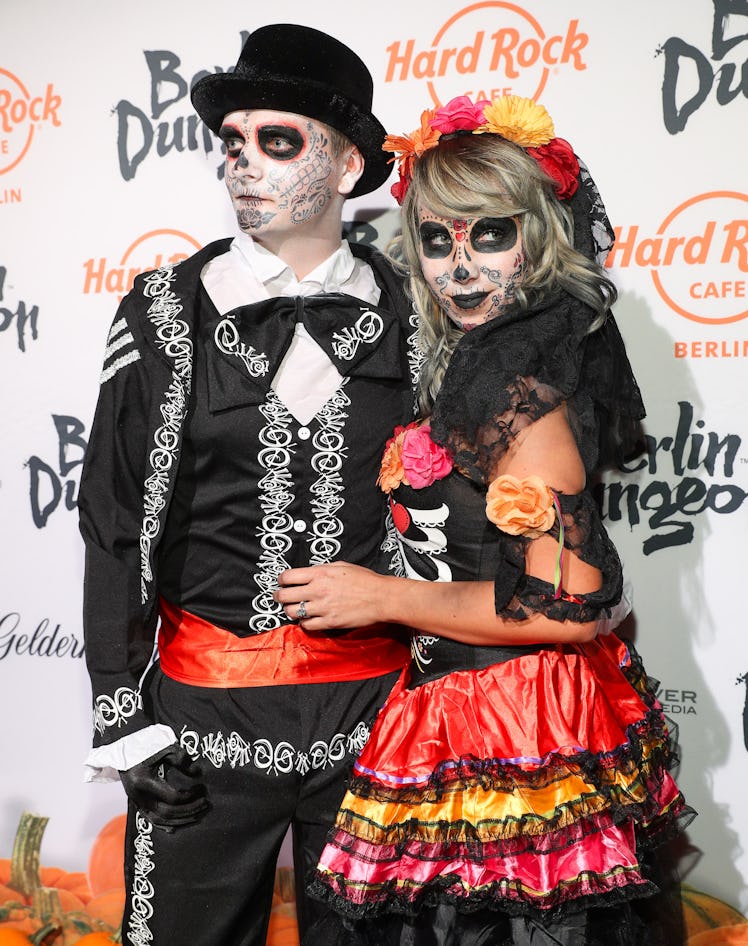
8 Popular Halloween Costumes That Are Actually Super Racist
Halloween is around the corner, so for those of you who still haven't decided on a costume, here are eight racist Halloween costumes you should know better than to try this year. Each year, culturally insensitive Halloween costumes become less and less tolerated by the general public (and honestly, they should've never even been tolerated in the first place, but that's a totally different essay), but there are always people who think they can get away with it. Even if you were guilty of wearing an appropriated outfit when you were a kid, learn from yours (or your parents') mistakes and don't be that person this year.
Any Type Of Blackface
Let's not forget how the public scrutinized actress Julianne Hough in 2013 for putting on "blackface" while dressing up as Uzo Aduba's character Suzanne "Crazy Eyes" Warren from the Netflix show, Orange is the New Black. While the actress publicly apologized for her insensitive costume, it will never be forgotten. This is proof that even if you're dressing up as a popular character in what you think is a positive way, darkening your skin to look like them is not ever necessary or OK. There's been enough racist blackface examples in the history of American entertainment to illustrate that point.
In addition, any costume that relates to the shooting of an African-American by a police officer is off the table, but that's common sense, right? Apparently not, considering two Florida residents simulated the Trayvon Martin and George Zimmerman shooting in a 2013 Halloween costume, with one wearing blackface and a blood-stained sweatshirt, and other wearing a shirt with the words "Neighborhood Watch" on it. Needless to say, it went viral in the worst meaning of the term.
The Native American "Look"
For many young girls, the Native American Halloween costume was a popular go-to when they were growing up, but again, let's learn from our mistakes and be more creative this year by choosing a costume that is not reductionistic or insensitive towards a culture we don't belong to, and, yes, this includes dressing up in character as Pocahontas.
With recent controversies surrounding "Indigenous Peoples Day" replacing "Columbus Day," it's safe to assume it's not an appropriate option for a Halloween costume anymore.
Mexicans Or Dias De Los Muertos Costumes
It's probably not a great idea to pull out your Mexican poncho, sombrero, and fake mustache and call yourself an authentic "Mexican." It's also not a great idea to simulate "the wall" that Trump intended (and still very much intends) to build as a funny Halloween costume.
Another costume that has been a popular trend for its intricate makeup has been the sugar-skull face that was stolen from the Mexican holiday, Dias De Los Muertos, or Day of the Dead, which is a completely separate holiday. Considering how controversial the issue of immigrant and undocumented citizens is recently, let's opt-out on costumes that reduce cultures to stereotypes for good.
Don't Pull A Katy Perry And Be A Geisha
Another example of culture appropriation that should be avoided is the geisha costume. This may sound redundant, but it's a form of reducing a culture to a stereotype that's just not acceptable in 2017. Katy Perry received flack for portraying a geisha in her 2013 American Music Awards performance. There's been enough stories like this for people to finally learn from celebrity mistakes.
Don't Even Consider A Terrorist Costume
Talk about reducing a culture and region of the world to a stereotype. A Middle Eastern terrorist costume is offensive on many levels. It not only reduces an entire group of people to a stereotype, but it also reduces a culture to the assumption that they all participate in extremist mass destruction. This may seem like common sense, but it's important to reiterate.
In case you are still wondering what constitutes as cultural appropriation and are troubled about offending people this year, consider this list of "nos" that the University of Utah's Student Affairs Diversity Council released for students to avoid insensitive costume choices:
Think to yourself: Does the actual name on the costume packaging say 'tribal,' or 'traditional'? Does the costume include race-related hair or accessories (dreads/locs, afros, cornrows, a headdress)? Does the costume play into racial stereotypes? Does this costume represent a culture that is not my own? If you answered yes to any of these questions, you should rethink the costume and try again.
This year for Halloween, let's be better and call out our friends and family when we see an insensitive costume, and let's carry on this tradition of creating new and innovative ideas that don't exploit cultures each following year.